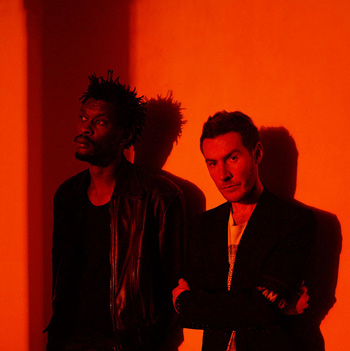MASSIVE ATTACK
July 29, 2014 - 8:30 pm

Iconic British band Massive Attack are widely considered to be the founders and catalysts of trip hop. Their unique “Bristol sound” remains one of the most influential of the last 20 years and tracks such as “Protection”, “Teardrop” and “Paradise Circus” have shaped the collective memory of several generations.
Currently touring their latest show in the biggest summer festivals, Massive Attack are pushing their audiovisual exploration of propaganda even further: expect a groundbreaking collision of music, visuals and technology!
MASSIVE ATTACK
Originally, DJ’s Grant “Daddy G” Marshall and Andrew “Mushroom” Vowles met as members of The Wild Bunch, one of the first sound system collectives in Britain and a dominant force in the early 1980s Bristolian club scene. Joined by painter-turned-MC Robert “3D” Del Naja, they formed Massive Attack in 1987. Starting out as a production trio, they released their first song “Any Love” independently the following year. Working with Nellee Hooper and Tricky – two former members of The Wild Bunch – they released their first official single “Daydreaming” in 1990. It featured the sultry vocals of singer Shara Nelson and was followed by “Unfinished Sympathy” and “Safe from Harm.” Finally, in 1991 Massive Attack issued their debut LP, Blue Lines. Not really a commercial success, the record was met with major critical praise, and was dubbed an instant classic in many quarters. Their hypnotic sound – a darkly sensual and cinematic fusion of hip-hop rhythms, soulful melodies, dub grooves, and choice samples – set the pace for much of the dance music to emerge from the 1990s. Featuring an array of distinctive guest vocalists like Tricky and Horace Andy, its impact is still felt to this day: “Nearly every song offers a sound currently in use in music’s taste-making leading edge” (Pitchfork).
Three years later, Massive Attack released Protection featuring Andy, Tricky, Nicolette and Everything But the Girl vocalist Tracey Thorn. The latter lent a jazzier feel and contributed songs to the album. Three singles – “Karmacoma,” “Sly,” and the title track – were released from the LP, which was also remixed in its entirety by Mad Professor and issued as No Protection. A long tour followed, and over the next several years, Massive Attack’s solo work was primarily confined to remixes for artists including Garbage; they also worked with Madonna on a track for a Marvin Gaye tribute album. Finally, to promote their appearance at the annual Glastonbury music festival, the group issued a new EP, Risingson, during the summer of 1997.
The third full-length Massive Attack effort, Mezzanine, appeared in mid-1998. In addition to reggae singer Horace Andy, making his third consecutive LP appearance with the group, vocals were handled by the Cocteau Twins’ Elizabeth Fraser and newcomer Sara Jay. Mezzanine became a hit among critics, clubs, and the college crowds, spinning successful singles such as “Teardrop” and “Inertia Creeps.” The album topped the U.K. chart and crossed into the Top 60 of the Billboard 200 in the U.S. A tour of America and Europe followed, but Vowles left the band after disagreeing with the artistic direction of Mezzanine. Del Naja and Marshall continued as a duo, later working with the likes of David Bowie and the Dandy Warhols. The same year, an 11-CD box set, Singles 90/98, compiled remixes of a career’s worth of singles.
In February 2003, after a five-year wait, Massive Attack released their fourth album, 100th Window, including collaborations with mainstay Horace Andy as well as Sinéad O’Connor. Marshall had taken a leave of absence to raise his family and Mezzanine producer Neil Davidge became Del Naja’s main collaborator throughout the sessions, and a central part of the group ever since. More experimental and melancholy, Massive Attack’s overall sound on this record integrated a degree of gothic post-punk texture and moodily cinematic electronica.
In 2004, they scored their first film Danny the Dog, which was never considered an official Massive Attack release by the band. From there, Del Naja and Davidge scored a handful of other films – In Prison My Whole Life, Battle in Seattle, and Trouble the Water, for which they earned an Oscar nomination – but their work was credited to their real names or the pseudonym 100 Suns rather than Massive Attack.
Their fifth album, Heligoland, released in 2010, marked the return of Daddy G and featured collaborations with a new line-up of guest vocalists including TV on the Radio’s Tunde Adebimpe, Elbow’s Guy Garvey, Martina Topley-Bird and roots reggae veteran Horace Andy who has appeared on all of their studio LP’s.
Massive Attack have won numerous music awards throughout their career, including a Brit Award—winning Best British Dance Act, two MTV Europe Music Awards, and two Q Awards. They have released 5 studio albums that have sold over 11 million copies worldwide. Their albums Blue Lines (1991) and Mezzanine (1998) feature in Rolling Stone’s list of the 500 Greatest Albums of All Time. 1991’s “Unfinished Sympathy” was voted the 10th greatest song of all time in a poll by The Guardian.
Despite being one of the most innovative and influential groups of their generation, they remain consistently adventurous, collaborating with enigmatic dubstep producer Burial on the Four Walls EP, and more recently with filmmaker and provocateur Adam Curtis on a series of groundbreaking shows. Designed and staged by Del Naja and Curtis in Manchester, Duisberg and New York, these site-specific events integrated music, film, politics, and redefined the very idea of a pop concert, transforming it into a collective hallucination.
This summer marks Massive Attack’s long-awaited return to the Festival circuit and Byblos is one of the lucky stops! Renowned for the dramatic atmosphere they create both on record and live, Lebanese audiences are in for a sensory overload!
